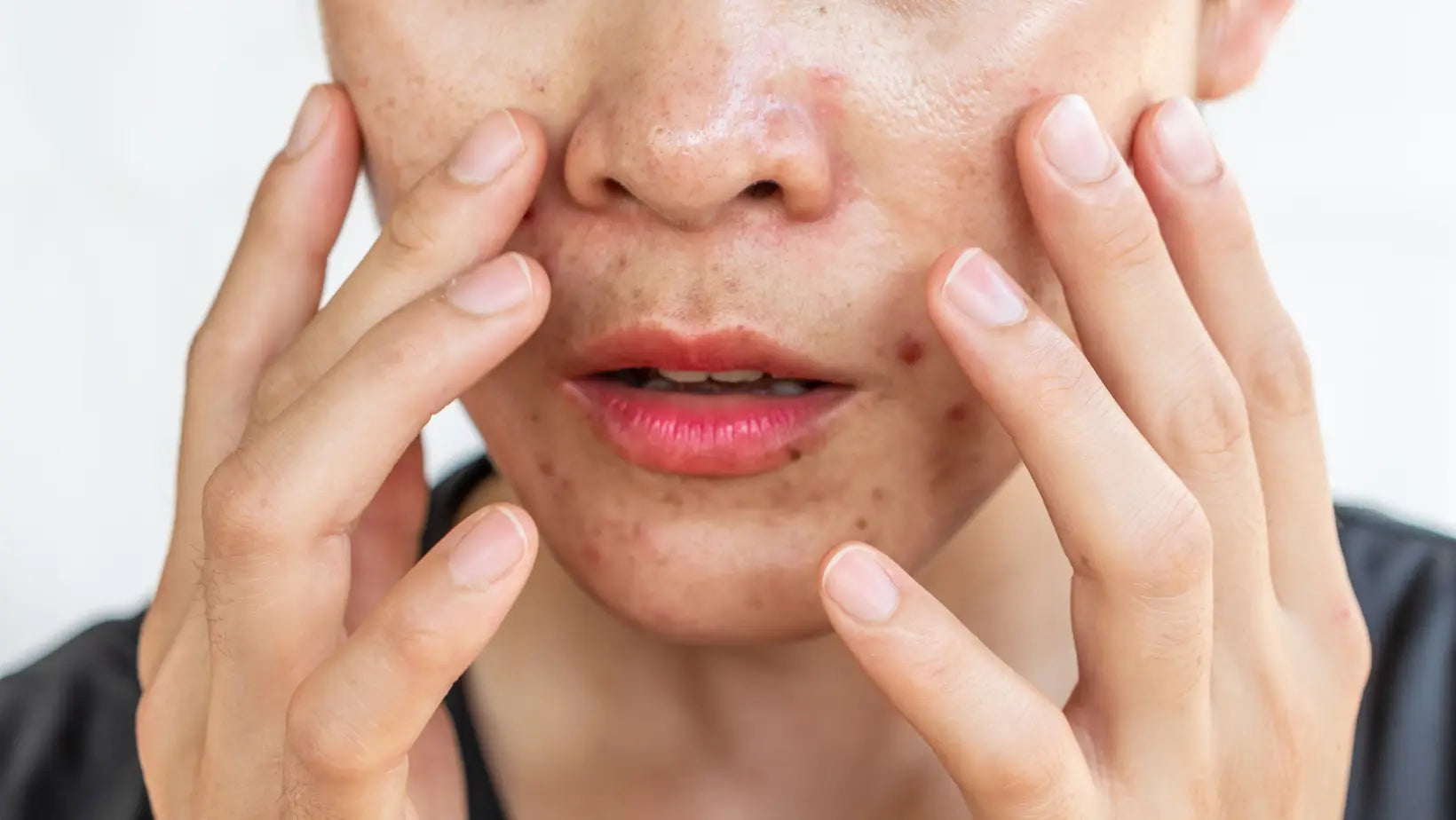
Sensitive skin care: Tips and tricks to avoid irritation
Sensitive skin is a common condition that can affect any skin type, whether dry, combination, or oily. This type of skin is characterized by an exaggerated reaction to various external and internal factors, such as cosmetic products, temperature changes, pollution, or stress. If you have sensitive skin, you probably often experience redness, itching, burning sensation, or dryness, which can be extremely frustrating and uncomfortable. For this reason, sensitive skin requires special and careful care to keep the skin healthy and comfortable.
Understanding and applying appropriate methods for caring for sensitive skin are essential to prevent irritation and discomfort. Choosing the right products and adopting gentle care habits can make a significant difference in the appearance and feel of your skin. Therefore, it is important to be well-informed and know how to properly care for your sensitive skin. In this article, you will discover useful tips and tricks to avoid irritation and maintain calm and healthy skin. Regardless of the challenges you face, there are effective solutions that can help you manage your skin's sensitivity and regain your confidence.
Identifying sensitive skin
Common signs
Identifying sensitive skin is the first step towards proper care. Sensitive skin manifests through a series of signs and symptoms that can range from mild to severe. Here are some of the most common signs of sensitive skin:
- Redness: Your skin may become red and inflamed in certain areas, especially after exposure to cosmetic products or environmental factors. This redness can be temporary or persistent and is often accompanied by a sensation of warmth.
- Itching: Sensitive skin can cause itching and discomfort. This sensation can be aggravated by external factors such as temperature changes, humidity, or pollution.
- Dryness: Sensitive skin tends to be dry and flaky because the skin barrier is compromised and does not retain moisture effectively. This can lead to a feeling of tight and uncomfortable skin.
- Peeling: Your skin may start to peel, especially in dry and irritated areas. This is a natural reaction of your skin to external aggressions and lack of proper hydration.

Trigger factors
To effectively manage sensitive skin, it is essential to identify and avoid triggers that can worsen symptoms. Among the most common triggers are:
- Cosmetic products: Certain ingredients in cosmetic products can irritate sensitive skin. These include fragrances, alcohol, preservatives, and colorants. Therefore, it is important to choose hypoallergenic and fragrance-free products.
- Environmental factors: Sudden temperature changes, wind, sun, and pollution can worsen skin sensitivity. Protecting the skin with appropriate products and avoiding excessive exposure to these factors can help reduce irritation.
- Diet: Spicy foods, alcohol, and caffeine can contribute to inflammation and worsen symptoms of sensitive skin. A balanced diet, rich in antioxidants and essential fatty acids, can help maintain skin health.
- Stress: Emotional and physical stress can trigger skin reactions, including redness and itching. Managing stress through relaxation techniques, such as meditation and physical exercise, can have a positive impact on your skin.
Understanding the signs and triggers of sensitive skin is crucial for adopting an appropriate care routine. By correctly identifying these elements, you can prevent irritations and keep the skin calm and healthy.
Tips for caring for sensitive skin:
1. Gentle cleansing routine
Recommended products
To protect and maintain the health of sensitive skin, it is essential to choose gentle cleansing products, specially formulated to minimize irritation and not compromise the skin's natural barrier. Here are some recommendations for cleansing products suitable for sensitive skin:
- Sulfate-free cleansing gels: Sulfates can be too harsh for sensitive skin. Choose cleansing gels that do not contain these harsh foaming agents.
- Fragrance-free and alcohol-free cleansing lotions: Fragrances and alcohol can dry out and irritate sensitive skin. Opt for cleansing lotions that are free of these ingredients.
- Micellar water: Micellar water is an excellent option for gently cleansing sensitive skin. It effectively removes impurities and makeup without irritating the skin.
- Products with soothing ingredients: Choose cleansing products that contain soothing and moisturizing ingredients, such as aloe vera, chamomile extract, and colloidal oatmeal. These help reduce redness and calm irritated skin.
Cleaning techniques
In addition to choosing the right products, cleansing techniques are just as important for maintaining the health of sensitive skin. Here are some tips for properly cleansing your skin:
- Use lukewarm water: Hot water can remove the skin's natural oils and may worsen irritations. Wash your face with lukewarm water to cleanse the skin without overdrying it.
- Gentle cleansing: Avoid aggressive rubbing of the skin with a towel or hands. Instead, use gentle circular motions to apply the cleansing product. You can also use a soft cotton pad to apply the micellar water.
- Do not rub the skin: After cleansing, gently pat your face with a clean, soft towel to dry it. Aggressive rubbing can cause irritation and damage the skin's protective barrier.

- Clean twice a day: Clean your face in the morning to remove excess sebum and impurities accumulated overnight, and in the evening to remove makeup, pollution, and dirt from the day.
- Avoid product overload: Using too many cleansing products can worsen skin sensitivity. Stick to a gentle and effective product to avoid overburdening your complexion.
Adopting a gentle cleansing routine, with suitable products and correct techniques, is crucial for maintaining the health and comfort of sensitive skin. By following these tips, you can prevent irritations and keep your skin clean, hydrated, and balanced.
2. Hydration and skin protection
Choosing the right moisturizer
Hydration is essential for maintaining the health and balance of sensitive skin. An appropriate moisturizer helps strengthen the skin barrier, preventing dryness and irritation. Here are some aspects to consider when choosing a moisturizer for sensitive skin:
- Soothing ingredient: Look for moisturizers that contain natural and soothing ingredients, such as aloe vera and jojoba oil. Aloe vera is known for its anti-inflammatory and moisturizing properties, helping to soothe irritated skin and reduce redness. Jojoba oil, being similar to the skin's natural sebum, provides deep hydration without clogging pores.
- Fragrance-free and alcohol-free formula: Avoid moisturizers that contain fragrances, alcohol, or other irritating substances. These can cause adverse reactions and may worsen skin sensitivity.
- Light texture: Choose lightweight, non-comedogenic formulas that absorb quickly into the skin and do not leave a greasy film. Gel-cream textures or lotions are ideal for sensitive skin.
- Repairing ingredients: Moisturizers containing ceramides, niacinamide, or hyaluronic acid are excellent for repairing the skin barrier and maintaining optimal hydration levels.
An excellent example is the moisturizing cream with hyaluronic acid from the Royal & Rich range. This cream is enriched with hyaluronic acid, plant extracts, and vitamin complexes, which help balance the hydration level essential for the skin and improve the natural renewal process. The product absorbs easily, leaving the skin smooth, elastic, and radiant. It also prevents aging due to the hyaluronic acid, while shea butter forms a protective barrier between the skin cells and the external environment, keeping it hydrated.
Sun protection
Sun protection is crucial for preventing skin damage and premature aging, especially for sensitive skin that may react negatively to sun exposure. Here are some tips for choosing and using a sunscreen:
- Broad-spectrum SPF: Choose a broad-spectrum sunscreen that protects against both UVA and UVB rays. An SPF of at least 30 is recommended for daily use.
- Formula for sensitive skin: Opt for products specially formulated for sensitive skin, which do not contain fragrance, alcohol, or other irritating ingredients. Products based on zinc oxide or titanium dioxide are ideal because they are gentle and provide effective protection.
- Light and non-comedogenic texture: Choose lightweight formulas that absorb quickly and do not clog pores. Lotions and gels are often more suitable for sensitive skin than heavy creams.
- Correct application: Apply sunscreen generously on the face and neck at least 15 minutes before sun exposure. Reapply every two hours and immediately after swimming or excessive sweating.

Daily use of a cream with appropriate sun protection not only protects sensitive skin from the harmful effects of the sun but also prevents further damage and the appearance of signs of aging.
3. Avoiding irritations
Cosmetic and makeup products
To avoid irritation, it is crucial to choose cosmetic and makeup products that are hypoallergenic and fragrance-free. Here are some useful tips:
- Hypoallergenic products: Choose products labeled as hypoallergenic, as they are formulated to minimize the risk of allergic reactions. These products are usually dermatologically tested and are less likely to cause irritation.
- Fragrance-free: Fragrances are a common cause of skin irritation. Opt for fragrance-free products, including creams, lotions, serums, and foundations.
- Mineral formulas: Mineral makeup is often gentler on sensitive skin. Mineral foundations and powders usually contain natural ingredients and avoid irritating chemicals.
Testing new products
Before introducing a new product into your skincare routine, it is essential to test it on a small area of skin to ensure it does not cause adverse reactions. Here's how to do it correctly:
- Patch test: Apply a small amount of product to a discreet area of the skin, such as the inside of the wrist or the area behind the ear.
- Wait 24-48 hours: Leave the product on the skin for 24-48 hours to observe any adverse reaction. If redness, itching, or irritation occurs, avoid using the product on the face.
- Introduce gradually: If the product does not cause adverse reactions, start integrating it gradually into your skincare routine, continuing to monitor your skin's reaction.
Avoiding aggressive exfoliants
Exfoliation is important for removing dead cells and stimulating cell regeneration, but it is essential to avoid harsh exfoliants that can irritate sensitive skin. Here are some recommendations for gentle exfoliation:
- Gentle chemical exfoliants: Choose chemical exfoliants that contain milder acids, such as lactic acid or mandelic acid. These are less irritating and help remove dead cells without damaging the skin barrier.
- Delicate physical exfoliants: If you prefer physical exfoliants, opt for products with fine and round particles that do not scratch the skin. Avoid exfoliants with large or rough particles, such as crushed apricot kernels.
- Low frequency: Exfoliate your skin only once or twice a week to avoid irritation. Listen to your skin and adjust the frequency according to its needs.
- Post-exfoliation hydration: After exfoliating, apply a soothing moisturizer to restore the skin's protective barrier and to prevent dryness and irritation.
Lifestyle tips
Balanced diet
A balanced diet plays a crucial role in maintaining skin health, especially for sensitive skin. Consuming foods rich in essential nutrients can help improve the appearance of the skin and reduce sensitivity. Here are some tips to optimize your diet for the benefit of your skin:
- Antioxidants: Antioxidants protect the skin against damage caused by free radicals and help with cellular repair. Consume fruits and vegetables rich in antioxidants, such as blueberries, strawberries, spinach, broccoli, and carrots. Vitamins C and E are powerful antioxidants that can help maintain skin health.
- Essential fatty acids: Omega-3 and Omega-6 fatty acids are crucial for maintaining the skin's lipid barrier and preventing dryness and inflammation. Incorporate foods rich in essential fatty acids into your diet, such as salmon, chia seeds, walnuts, and olive oil.
- Hydration: Drink enough water to keep the skin hydrated and to eliminate toxins from the body. Proper hydration is essential for healthy and glowing skin.
- Anti-inflammatory foods: Consume foods with anti-inflammatory properties, such as turmeric, ginger, avocado, and green tea. These can help reduce inflammation and soothe sensitive skin.
- Avoiding processed foods: Reduce the consumption of processed foods, refined sugars, and fast food, which can trigger inflammation and worsen skin sensitivity.
Stress management
Stress can have a significant impact on your skin health. Stress hormones, such as cortisol, can trigger inflammation, worsen existing skin conditions, and lead to the appearance of acne and other skin problems. Here are some strategies for managing stress and improving skin health:

- Regular physical exercise: Physical activity is one of the most effective ways to reduce stress. Aerobic exercises, such as walking, running, swimming, and yoga, can help release endorphins, the happiness hormones, which reduce stress levels.
- Meditation and mindfulness: Meditation and mindfulness practices can help calm the mind and reduce anxiety. Even a few minutes of daily meditation can have a positive effect on your mental state and your skin.
- Adequate sleep: Make sure you get enough sleep to allow your body and skin to regenerate. Lack of sleep can worsen inflammation and lead to dark circles and dull complexion.
- Breathing techniques: Deep breathing exercises can help reduce tension and calm the nervous system. Practice deep breathing daily to help you relax.
- Hobbies and enjoyable activities: Engage in activities that bring you joy and help you disconnect from everyday stress. Whether it's reading, painting, gardening, or any other hobby, these can have a positive impact on your mental state and your skin.
- Adopting a healthy lifestyle, which includes a balanced diet and effective stress management, can have a significant impact on the health and appearance of sensitive skin. Through these practices, you can keep your skin calm, hydrated, and free of irritation, contributing to an overall sense of well-being.
In conclusion, caring for sensitive skin requires special attention and a gentle approach to prevent irritation and maintain healthy skin. By correctly identifying signs and triggers, adopting a gentle cleansing routine, proper hydration and protection, avoiding harsh products, and maintaining a balanced lifestyle, you can effectively manage your skin's sensitivity. It is essential to use suitable, dermatologically tested cosmetic products and make informed choices to protect your skin from irritation and discomfort.
Discover now the Royal Rich product range specially formulated for sensitive skin! Enriched with natural and soothing ingredients such as hyaluronic acid, plant extracts, and shea butter, these products provide deep hydration and protection, keeping your skin smooth, elastic, and radiant.
Don't wait any longer, choose Royal Rich and give your skin the gentle and effective care it deserves!



Leave a comment
This site is protected by hCaptcha and the hCaptcha Privacy Policy and Terms of Service apply.